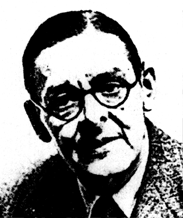

Thomas Stearns Eliot(1888-1965), American-born English poet, literary critic, dramatist, and winner of the Nobel Prize for literature, who is best known for his poem The Waste Land, one of the most widely discussed literary works of the early 20th century. His plays, which rely on a colloquial use of unrhymed verse, attempted to revive poetic drama for the contemporary audience. Eliot's methods of literary analysis have been a major influence on English and American critical writing. Eliot was born in St. Louis, Missouri, into a distinguished New England family, the son of a businessman and a poet. He was educated at Harvard University, the Sorbonne, and the University of Oxford. He became a resident of London in 1915 and a naturalized British citizen in 1927. Between 1915 and 1919 Eliot held various positions, including those of teacher, bank clerk, and assistant editor of the literary magazine Egoist. Eliot's first important poem was "The Love Song of J. Alfred Prufrock" (1915). In his first volume of verse, Prufrock and Other Observations (1917), he uses the imagery of urban life in a context of poetic intensity. The poems have no fixed verse form or regular pattern, and rhyme is used only occasionally. During the 1920s Eliot developed pronounced views on literary, religious, and social subjects. His long poem in five parts, The Waste Land (1922), is an erudite work that expresses vividly his conception of the sterility of modern society in contrast with societies of the past. In essays on such subjects as the Elizabethan dramatists, the English metaphysical poets, and Italian poet Dante, Eliot profoundly influenced the tenets of literary criticism. He contended, in the collection of The Sacred Wood (1920), that the critic must develop a strong historical sense in order to judge literature from a proper perspective, and that the poet must be impersonal in the creative exercise of the craft. As founder and editor of The Criterion from 1922 to 1939, he provided a literary forum for many prominent contemporary writers. In the collection of essays For Lancelot Andrewes (1928), he describes his position as that of a classicist in literature, a royalist in politics, and an Anglo-Catholic in religion. Beginning in the 1930s the qualities of serenity and religious humility became paramount in Eliot's poetry, notably in Ash Wednesday (1930), The Rock (1934), and his long verse play, Murder in the Cathedral (1935), based on the 12th-century martyrdom of Saint Thomas à Becket. Four Quartets (1943), considered by many critics his finest work, expresses in moving verse a transcendental sense of time. He received the Nobel Prize for literature in 1948 and the United States Presidential Medal of Freedom in 1964. Eliot's fame as a playwright dates from the successful production of The Cocktail Party (1949), which explored the theme of salvation in a context of modern drawing-room comedy. Other dramatic presentations of religious and moral themes are The Confidential Clerk (1954) and The Elder Statesman (1958). Among his other works are Old Possum's Book of Practical Cats (1939) a book of verse for children, which was adapted for the musical theater stage and began running in 1981; the plays Sweeney Agonistes (1932) and The Family Reunion (1939); and the prose works The Idea of a Christian Society (1940) and Notes Toward a Definition of Culture (1948)."Eliot, T(homas) S(tearns)," Microsoft(R) Encarta(R) 97 Encyclopedia. (c) 1993-1996 Microsoft Corporation. All rights reserved.
Home § The Poem § T.S. Eliot § Analysis § Links § About Me § Credits